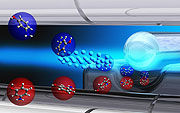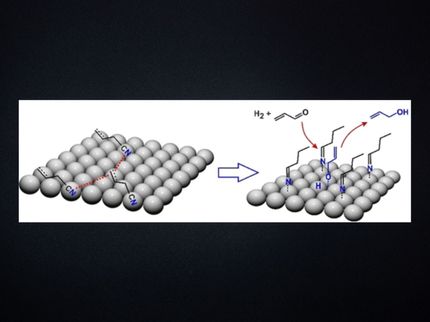Chemists used crab shells to improve palladium catalysts
A new type of palladium catalysts based on chitin can be reused over 10 times
Chemists from RUDN University synthesized soluble biopolymers based on chitin from crab shells. Together with palladium, they form effective catalysts for organic reactions, and their nanoparticles can be re-used over ten times.
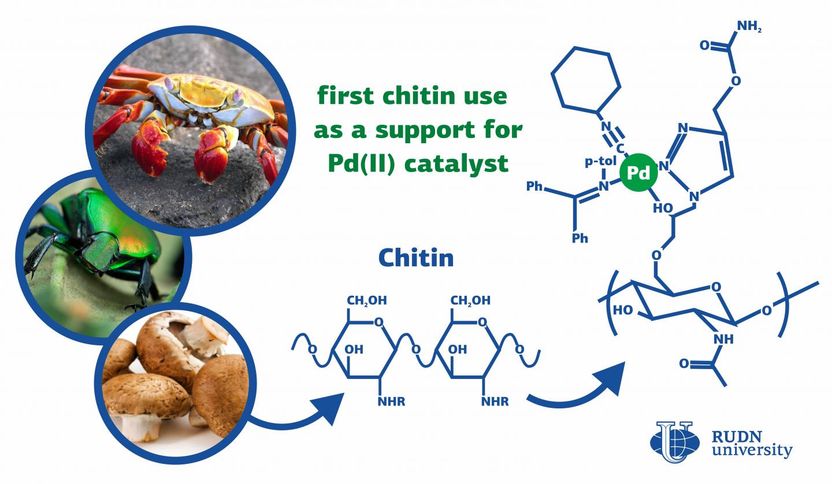
Chemists from RUDN University synthesized soluble biopolymers based on chitin from crab shells. Together with palladium, they form effective catalysts for organic reactions, and their nanoparticles can be re-used over ten times.
RUDN University
Palladium-based catalysts are used to speed up cross-coupling reactions in which two fragments are bound together via atoms of carbon. Cross-coupling reactions with palladium-based catalysts account for about 17% of all reactions in medicinal chemistry. However, the majority of palladium-based catalysts are non-reusable. A team of chemists from RUDN University suggested a new type of palladium catalysts based on chitin that can be reused over 10 times.
Chitin is obtained from carapaces and exoskeletons of arthropods (mainly marine ones) and most of its derivatives are difficult to modify. However, the team managed to synthesize several chitin compounds that could be used in organic chemistry. To do so, they mixed chitin powder made from crab shells with water and organic compounds that contained azide groups (N3). After that, the mixture was subject to ultrasound for 20 minutes. The end product was a polymer in which 40% of fragments were bound with azide groups. At the next step, the polymer was completed with ethers of amino acids, and each azide group was replaced with a cycle with three nitrogen and two carbon atoms. Then, the new substance was mixed in a methanol solution with a palladium-based catalyst. After that, the mix was added to a chitin derivative solution at the rate of one or two drops every couple of minutes. As a result, the team obtained catalyst nanoparticles (20 to 110 nm in size).
The team tested the catalytic properties of the nanoparticles in a cross-coupling reaction that bound together fragments of aryl halides and alkynes. The reaction was carried out at 70°C in different solvents (water, toluene, and hexane) and in presence of different bases. Having studied 32 variants of the reaction, the team concluded that the new catalyst was the most effective in water, in the presence of potassium carbonate, and in the form of 30 nm nanoparticles. When these conditions were met, the yield of the reaction reached 100%. The chemists also checked if the catalyst could be reused with these reaction parameters. After the first reaction, the nanoparticles were separated from the end product in a centrifuge, washed with water, dried out, and used again. This process was repeated 10 times with no reduction of the yield or damage to the nanoparticles.
"We have obtained evidence confirming our concept of effective chitin-based catalysts for organic synthesis. The key advantage of the new catalyst is its reusability. It is still unknown what makes the nanoparticles of the palladium-chitin complex so stable, and this is what we intend to find out in our future studies. We also plan to use the new nanoparticles as a catalyst in other cross-coupling reactions," said Andreii Kritchenkov, PhD and an assistant researcher at the Department of Inorganic Chemistry, RUDN University.
Original publication
Most read news
Other news from the department science
These products might interest you
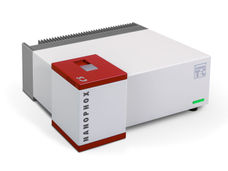
NANOPHOX CS by Sympatec
Particle size analysis in the nano range: Analyzing high concentrations with ease
Reliable results without time-consuming sample preparation

Eclipse by Wyatt Technology
FFF-MALS system for separation and characterization of macromolecules and nanoparticles
The latest and most innovative FFF system designed for highest usability, robustness and data quality

DynaPro Plate Reader III by Wyatt Technology
Screening of biopharmaceuticals and proteins with high-throughput dynamic light scattering (DLS)
Efficiently characterize your sample quality and stability from lead discovery to quality control

Get the chemical industry in your inbox
By submitting this form you agree that LUMITOS AG will send you the newsletter(s) selected above by email. Your data will not be passed on to third parties. Your data will be stored and processed in accordance with our data protection regulations. LUMITOS may contact you by email for the purpose of advertising or market and opinion surveys. You can revoke your consent at any time without giving reasons to LUMITOS AG, Ernst-Augustin-Str. 2, 12489 Berlin, Germany or by e-mail at revoke@lumitos.com with effect for the future. In addition, each email contains a link to unsubscribe from the corresponding newsletter.
Most read news
More news from our other portals
Last viewed contents
Category:Norepinephrine_reuptake_inhibitors
Budesonide/formoterol
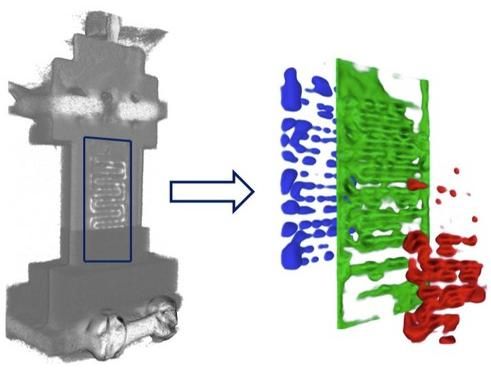
Water distribution in the fuel cell made visible in 4D - The analysis opens new possibilities for more efficient and thus more cost-effective fuel cells
Category:British_chemists
